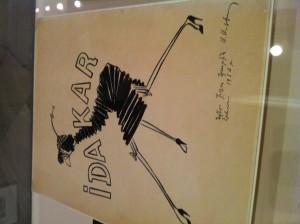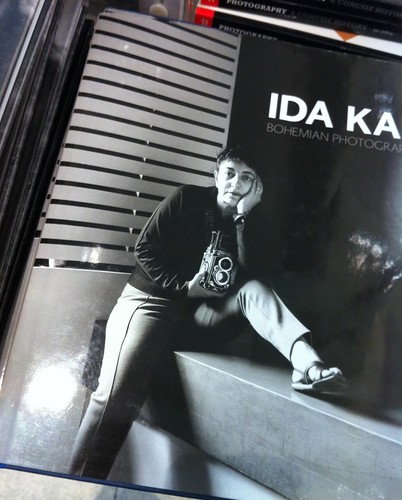I had an hour to kill one day last week before a meeting in London and took the opportunity to see the Ida Kar exhibition at the National Portrait Gallery.
 She was billed as a “bohemian photographer”, which was intriguing, and her work was unknown to me. Turns out that she was an Armenian who went to study in Paris in the late 1920s and was much influenced by the artists she encountered there. She lived in Cairo for a while and came to London in 1945 with her second husband. She tried to set up as a theatrical photographer, but seems to have more success with painters and sculptors, and these are the basis for the NPG retrospective.
She was billed as a “bohemian photographer”, which was intriguing, and her work was unknown to me. Turns out that she was an Armenian who went to study in Paris in the late 1920s and was much influenced by the artists she encountered there. She lived in Cairo for a while and came to London in 1945 with her second husband. She tried to set up as a theatrical photographer, but seems to have more success with painters and sculptors, and these are the basis for the NPG retrospective.
There are lots of memorable pics. A wonderful picture of Bertrand Russell, scribbling in what looks like a Moleskine notebook while sitting for a portrait painter. Marc Chagall, wistful in a ribbed sweater. Graham and Kathleen Sutherland, at home in front of fireplace and a table loaded with pre-lunch drinks: impeccably upper-middle class, don’t you know. There’s Stanley Spencer under his trademark black umbrella and a terrific 1954 picture of Fernand Leger in a heavy tweet suit and matching cap, looking more like a bookie or a farmer than an avant garde painter. There’s a shot of Man Ray looking dubious in a tartan waistcoat, and one of Le Corbusier in short sleeves and heavy round glasses. A particularly nice portrait of Eugene Ionesco, sheltering thoughtfully behind a pile of books comes before a shot of T.S. Eliot in 1959 looking like a triumph of the embalmer’s art, and one of Jean-Paul Sartre, boss-eyed and formal in front of tottering piles of files. Kar caught Iris Murdoch in 1957, sitting on the floor surrounded by the ms of The Bell, looking fey and somehow dangerous (the best — i.e. most revealing — picture in the exhibition, IMHO.)
Other images that caught my eye included one of Augustus John in 1959, looking fierce and slightly potty; a lovely wistful pic of Laurie Lee in 1956; Colin McInnes reclining full length on a bed; the painter Terry Frost captured in 1961 in his St Ives studio overlooking the beach; Somerset Maugham in the Dorchester in 1958, looking not just starchy but positively stuffed in a tightly buttoned double-breasted suit; and a lovely 1968 pic of Bill Brandt, perched on an antique chair in his Kensington flat.
The obvious comparison, of course, is with Lee Miller and her photographs of the surrealist painters with whom she and Roland Penrose mixed. But the abiding impression of the Kar show was its evocation of the 1950s: what a strange time it must have been; and how small and constrained London must have been then.
I was also left musing over the adjective “bohemian”. What, I wondered, had the inhabitants of that lovely part of central Europe done to deserve such raffish connotations. As ever, Wikipedia came to the rescue. The term bohemian, it seems, came to refer to “the nontraditional lifestyles of marginalized and impoverished artists, writers, musicians, and actors in major European cities – emerged in France in the early 19th century when artists and creators began to concentrate in the lower-rent, lower class gypsy neighbourhoods”. Quite so.
Well worth a visit, if you have the time.

